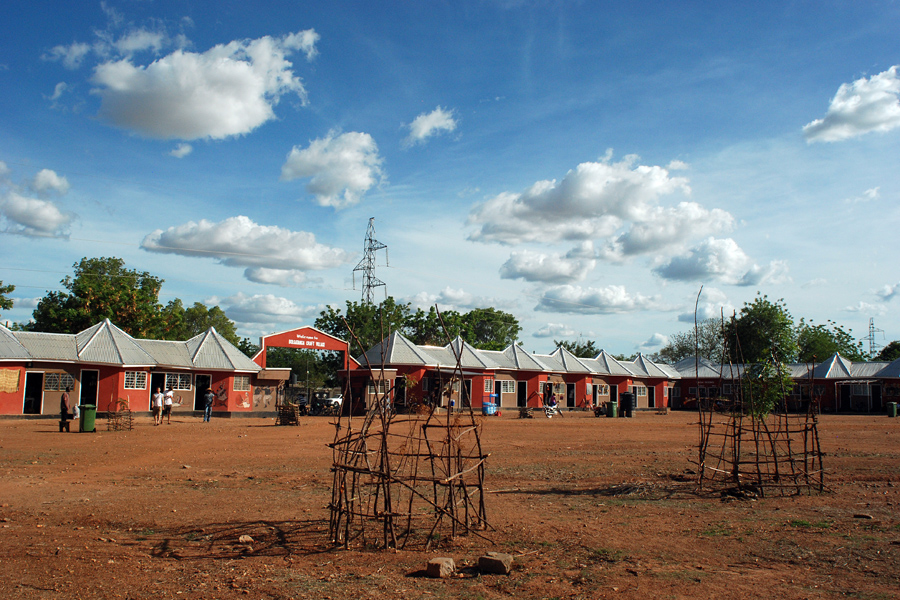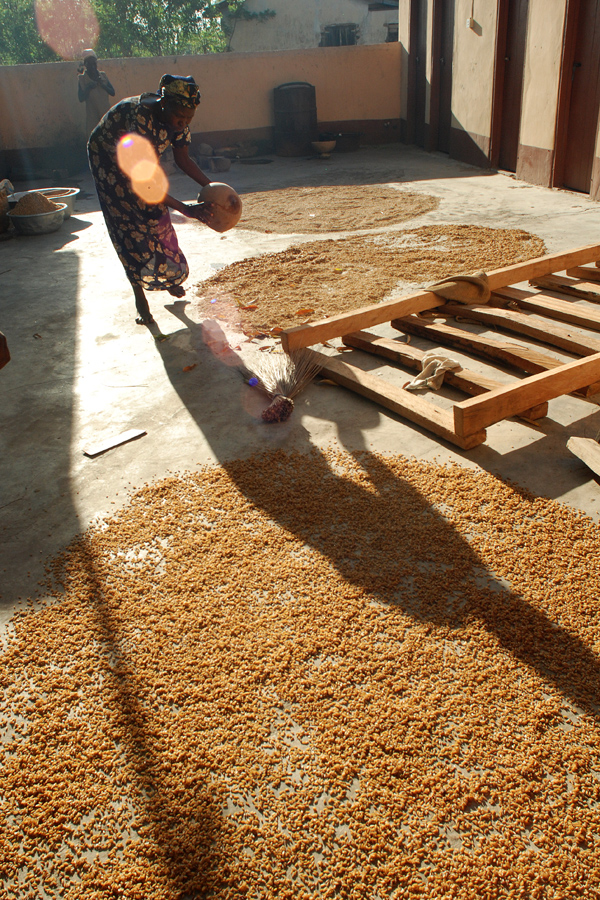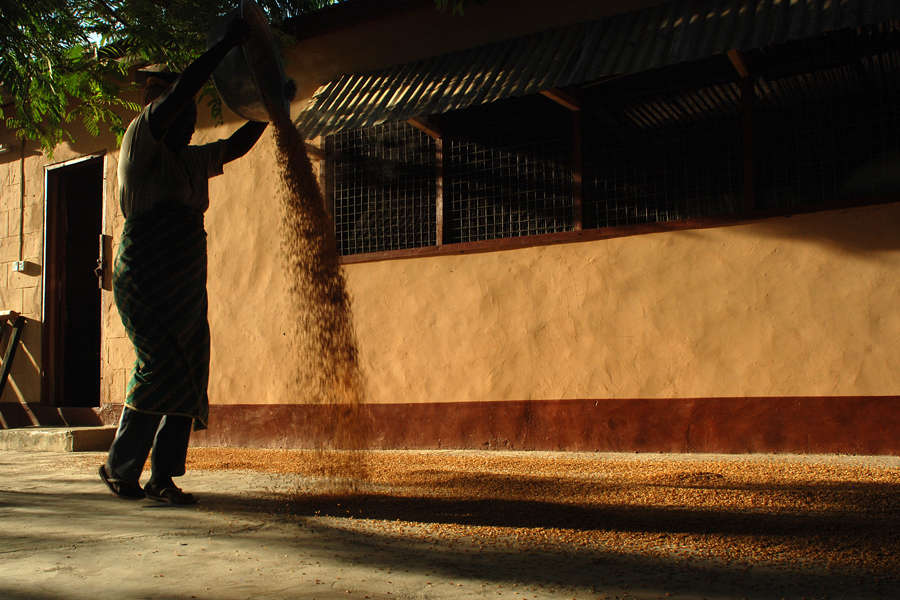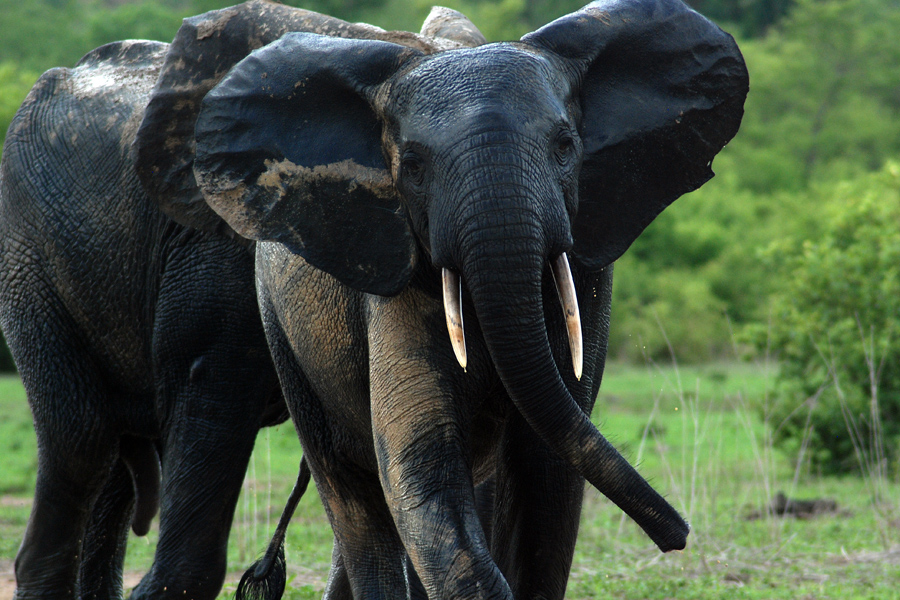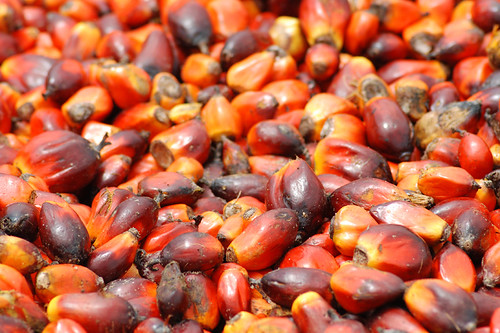We’ll be holding recycled Basket giveaways over at G-lish too. If you want a chance to win one of these be-you-T-full baskets, wherever you are in the world, subscribe to G-lish! Winners will be announced at the end of the month.
Meanwhile, if you can’t wait that long, and you’re in Ghana, you can find the baskets at Trashy Bags in Accra. Check out Trashy Bags videos for more info on their brilliant work in the capital of Ghana.
We’ll also be holding competitions along those lines here so look out and be sure to enter this one if you want to win.
August 31, 2010
August 30, 2010
Warning: Recycled Baskets Contain Love
WARNING: As a Recycled Bolga Basket I should mention that I’m created from 230 “pure water” plastic bags, and over 2 yards of scrap cloth. Yes—I was once waste, but I’m now rather striking don’t you think? It’s all thanks to the brilliant, basket-weaving communities of Bolgatanga in the Upper East Region of Ghana who will be able to buy medicine and pay school fees when you buy me. That’s because they get paid fairly for creating me. Oh, and for every basket you buy, G-lish plants a tree in Bolgatanga, regenerating the deforested, northern-most region of Ghana—and creating sources of food, shade and shelter in the community.
G-lish’s vision: Thousands of us baskets will find homes across the globe and thousands of trees blossom across the Upper East.
G-lish: solving environmental problems, preserving an age-old handicraft tradition, and providing sustainable incomes for impoverished, rural, Ghanaian craftswomen and men. (They’re not basket cases in Bolga, I can tell you!)
Look out for more at G-lish: www.g-lish.org. Contact: baskets@g-lish.org
The basket-makers asked me to tell you…
“We thank you! Teppohzoe!”
Find the baskets at Trashy Bags in Accra. Click the image at the top of the pagwe for directions.
G-lish’s vision: Thousands of us baskets will find homes across the globe and thousands of trees blossom across the Upper East.
G-lish: solving environmental problems, preserving an age-old handicraft tradition, and providing sustainable incomes for impoverished, rural, Ghanaian craftswomen and men. (They’re not basket cases in Bolga, I can tell you!)
Look out for more at G-lish: www.g-lish.org. Contact: baskets@g-lish.org
The basket-makers asked me to tell you…
“We thank you! Teppohzoe!”
Find the baskets at Trashy Bags in Accra. Click the image at the top of the pagwe for directions.
That's what's on the lable of the baskets!
August 29, 2010
One Basket = One Tree
Another positive aspect of the recycled Bolga basket project is that for every basket sold the producers plant a tree in the community. Currently they are planting mango trees, the most popularly requested, since mangos provide excellent shade during the extremely hot season and have a natural cooling effect. They are the coolest places to be when outdoors during the hot season.
Of course, they also provide fruit and nutrition which are much needed in the Upper East where the average diet consists of cornmeal porridge and soup—not at all meeting daily nutrition requirements.
For the record, the price of the Ghana guide will increase as we also have a campaign to plant one tree for every guide sold—increasing the tree-planting scope so that thousands of trees will begin to grow across deforested parts of Ghana where they are badly needed.
Trees are valued and precious in Bolga because of the need for shade and wish for fruit to supplement the very bland diet. The basket makers and producers are very excited about this.
This is a long term vision, inspired by Wangari Maathai’s Greenbelt movement.
So, when you buy a recycled Bolga basket, you’re not only providing livelihoods to Ghana’s poorest men, women and youth, but also providing shade, shelter and sources of food for many years to come and greening Ghana too.
A basket maker in the cool of dusk. You can see how barren the Upper East is. We need trees!
Of course, they also provide fruit and nutrition which are much needed in the Upper East where the average diet consists of cornmeal porridge and soup—not at all meeting daily nutrition requirements.
For the record, the price of the Ghana guide will increase as we also have a campaign to plant one tree for every guide sold—increasing the tree-planting scope so that thousands of trees will begin to grow across deforested parts of Ghana where they are badly needed.
Trees are valued and precious in Bolga because of the need for shade and wish for fruit to supplement the very bland diet. The basket makers and producers are very excited about this.
This is a long term vision, inspired by Wangari Maathai’s Greenbelt movement.
So, when you buy a recycled Bolga basket, you’re not only providing livelihoods to Ghana’s poorest men, women and youth, but also providing shade, shelter and sources of food for many years to come and greening Ghana too.
Labels:
Accra,
Africa,
blogsherpa,
Bolga Baskets,
Ghana,
recycled products,
Trashy Bags
August 28, 2010
Saving 7000 Pure Water Bags
Part of the objective of making recycled Bolga baskets is to clean up the environment by directly using materials that would otherwise be discarded; in particular “pure water” plastic bags and scrap cloth. Not only are they discarded, but they’re often burnt, emitting harmful gases and pollutants into the atmosphere.
In the month of August alone basket makers have used over 6000 plastic bags to produce their baskets—the very ones selling in Trashy Bags now! They envisage using over 7000 by the 31st. Each basket uses an average of 230 plastic bags each, some more, some less, depending on the final size.
While we recognize that the volume of rubbish is small on a global scale, every bit makes a difference. And it’s not just about the relativity of the global impact, but small changes in behaviour that may lead to widespread changes. And beautiful baskets.
By the way, we'll be givi ng away baskets as prizes over at G-lish to one subscriber a month. If you want a chance to win, go over and subscribe to G-lish: http://www.g-lish.org/
Recently produced baskets sitting on a sea of pure water plastic bags. Each basket uses about 230 pure water bags on average!
In the month of August alone basket makers have used over 6000 plastic bags to produce their baskets—the very ones selling in Trashy Bags now! They envisage using over 7000 by the 31st. Each basket uses an average of 230 plastic bags each, some more, some less, depending on the final size.
While we recognize that the volume of rubbish is small on a global scale, every bit makes a difference. And it’s not just about the relativity of the global impact, but small changes in behaviour that may lead to widespread changes. And beautiful baskets.
By the way, we'll be givi ng away baskets as prizes over at G-lish to one subscriber a month. If you want a chance to win, go over and subscribe to G-lish: http://www.g-lish.org/
August 27, 2010
Totally Uncrappy Bolga Baskets
You know when crappy marketers write “Be quick, limited stock available!” and you just don’t believe them anymore?
Here’s a line for you: “Be quick: Hot recycled Bolga baskets sell quickly.”
But this is not crappy marketing, this is just being honest. These baskets go quickly. So quickly that the photos to show from last week’s delivery are redundant because the damned things sold out already.
However, you’re lucky. A new delivery has just arrived at Trashy Bags in Accra. If you want to buy a recycled Bolga basket, you do have to be fast. They are popular—which makes the craftspeople in Bolga happy—more sales more incomes for some of Ghana’s most impoverished communities.
Find the baskets by heading to Trashy’s shop in Accra. Here are the directions.
Here’s a line for you: “Be quick: Hot recycled Bolga baskets sell quickly.”
But this is not crappy marketing, this is just being honest. These baskets go quickly. So quickly that the photos to show from last week’s delivery are redundant because the damned things sold out already.
However, you’re lucky. A new delivery has just arrived at Trashy Bags in Accra. If you want to buy a recycled Bolga basket, you do have to be fast. They are popular—which makes the craftspeople in Bolga happy—more sales more incomes for some of Ghana’s most impoverished communities.
Find the baskets by heading to Trashy’s shop in Accra. Here are the directions.
Labels:
Africa,
blogsherpa,
Bolgatanga,
Ghana,
recycled Bolga baskets,
Upper East
August 26, 2010
Recycled Bolga Basket Stars
A glimpse of some of the basket makers working on recycled Bolga baskets. The producers work from their home, usually a mud and thatch room in a large family compound. They work on the baskets as time and commitments allow.
Right now it’s harvest time so everyone is busy on their maize and millet farms. Many have children that they attend to while working on the baskets too.
You can find these truly unique, world-first (we believe…correct us if this is done anywhere else), gorgeous baskets at Trashy Bags in Accra.
Right now it’s harvest time so everyone is busy on their maize and millet farms. Many have children that they attend to while working on the baskets too.
Labels:
blogsherpa,
Bolga Baskets,
crafts,
fair trade,
Ghana,
recycling
August 11, 2010
Change by Volunteer Design
I have been showing a great series of photos taken by a photographer who visited Ghana in 2009 to work on a community building project. I'd like to start showing some of the photos from the project so that you can get a strong picture of the life of a community volunteer in Ghana.
You can read the full history of the program in this article, Giving, By Design, in Mimian Magazine. Here is a short excerpt:
The article continues:
I enjoyed the quote beneath the photograph series by Adam Nelson on this project that reads: "100 degree heat, an African sun that feels about 6 in from your face, and not a power tool in sight. ready/set/build!"
The sun does feel about 6 inches from your face here in Ghana. Imagine building by hand! That's how it is for virtually every building I've ever witnessed being built. That's how it was for these students too.
Have a look at the whole building project series here at super.heavy's photostream on Flickr.
You can read the full history of the program in this article, Giving, By Design, in Mimian Magazine. Here is a short excerpt:
"Ghana Design/Build, the resulting program founded by Della-Piana, remains the longest running summer studio workshop in the department of architecture and interior design. Since 1998, interdisciplinary teams of Miami students have completed nine buildings — including a children’s library, a marketplace, a community center, and in 2008, a computer facility."
The article continues:
"To prepare for their six weeks in the West African country, students attend a series of classes about its culture, language, and politics. Upon arrival, they visit Abrafo-Odumase and are introduced at an “opening ceremony.” Before embarking on a two-week tour of the country, students sketch the future job site. While on the road, they create multiple designs."
I enjoyed the quote beneath the photograph series by Adam Nelson on this project that reads: "100 degree heat, an African sun that feels about 6 in from your face, and not a power tool in sight. ready/set/build!"
The sun does feel about 6 inches from your face here in Ghana. Imagine building by hand! That's how it is for virtually every building I've ever witnessed being built. That's how it was for these students too.
“Once we get the go-ahead from the chiefs, we just start building,” says J.E. Elliott, professor of architecture and interior design, who has served as the faculty sponsor since 2006. “There is no bureaucracy. Our building permit is a pick and a shovel.” Read the full story in Mimian Magazine.
Have a look at the whole building project series here at super.heavy's photostream on Flickr.
August 9, 2010
Upper East Photo Journey
Now, seeing as though this is now my "home" town, I have few excuses for not showing my own photos. These, however, are not mine. These photos were taken by photographer Adam Nelson. You can check out all his Ghana photos at super.heavy on Flickr.
The first image is of the Bolga "craft village". While it does "somehow" resemble a village, they do not actually demonstrate any art or craft-making here, unfortunately. I feel it's a lost opportunity for Bolga craftspeople, given the huge amount of space available there. If you do want to see weaving of cloth in action, head to the Bolga market, about 800 m from here. You can also ask around to visit basket makers in Bolga if you're interested.
The photo below is from the Single Mothers Association located here in Bolgatanga in the Upper East Region.
And in the photo below is a demonstration of "winnowing" the rice which basically helps remove rubbish and any unwanted particles from the rice.
You can read more about the Upper East Region of Ghana here. And then, finally, many people do visit Paga crocodile ponds which are on the border with Burkina Faso. Check out this photo. If you ever wanted to get this cosy with a crocodile, then Paga is certainly the place to do it. It's about 45 minutes north of Bolga by taxi or an hour by tro.
The first image is of the Bolga "craft village". While it does "somehow" resemble a village, they do not actually demonstrate any art or craft-making here, unfortunately. I feel it's a lost opportunity for Bolga craftspeople, given the huge amount of space available there. If you do want to see weaving of cloth in action, head to the Bolga market, about 800 m from here. You can also ask around to visit basket makers in Bolga if you're interested.
The photo below is from the Single Mothers Association located here in Bolgatanga in the Upper East Region.
And in the photo below is a demonstration of "winnowing" the rice which basically helps remove rubbish and any unwanted particles from the rice.
You can read more about the Upper East Region of Ghana here. And then, finally, many people do visit Paga crocodile ponds which are on the border with Burkina Faso. Check out this photo. If you ever wanted to get this cosy with a crocodile, then Paga is certainly the place to do it. It's about 45 minutes north of Bolga by taxi or an hour by tro.
August 8, 2010
Mole National Park Photo Journey
The images here are courtesy of the collection of photos taken by photographer Adam Nelson. You can check out all his Ghana photos at super.heavy on Flickr.
This particular post focuses on Mole National Park in the Northern Region of Ghana. The park is a 4 hour bus ride on public transport (Metro bus) from Tamale. If you have your own 4WD, it's about 7 hours from Kumasi or 2 hours from Tamale, depending on how muddy the roads are.
The next photo shows very much how Mole looks right now, in the wet season. The lake is full and the landscape is bright green. You have a good chance of viewing elephants playing and swimming in the waterhole from ground level.
One of the joys of visiting Mole National Park during the rainy season is this: elephants 10 or 20 feet before you, a mesmerising spectacle.
If you stay at Mole Motel, which is located inside the park environs, this is the view from the escarpment where the hotel and its restaurant and poolside area is located.
August 3, 2010
Secret to Surviving Ghana
Ghana would flash alongside despots and endangered gorillas on the international media’s Africa radar if peace and friendliness were newsworthy. But Ghana, a nation where followers of all faiths—Christians, Muslims, and Traditionalists, all—work, eat, joke, and vote together, displaying a remarkably high level of mutual acceptance as they enjoy their constitutional right to Freedom of Worship, is still a bit of a secret. If there’s one thing we’re not good at, though, it’s keeping secrets that really ought to be shared, which is why we decided to write this story.
The idea took form during one of many spontaneous trotro journeys. I had been “sweating like a pregnant toad”, as Ghanaians say, in velvet-heavy humidity on the hot side of an old, rusting lorry-bus (trotro), while a lay-preacher shouted a revival-style sermon above my head for three hours before we set off on a four hour journey that unfolded, like a market lady’s wrap skirt, to seven hours, because we broke down. It was while five men were simultaneously shouting at the driver who was banging on a piece of smoking engine, and every other man stood peeing along the road facing the jungle halfway to Kumasi, and one proposed for my hand in marriage, that the three Ghana survival essentials whacked me over the head. It was a perfect Zen-coma-trotro moment, a state you must enter to endure and rationalize the numerous near death experiences and delays that every road journey absolutely guarantees. I thought I best mention these survival essentials now, before we get started; you might want to find another country. Although, this advice applies in varying degrees to travel across all of Africa and most developing nations.
Right. So, when a man (or woman) peeing along the side of the highway proposes marriage to you midstream—the eleventh in two days (granted, the other ten weren’t peeing)—and all you want to do yourself is pee (but you can’t because all eyes are on you), and get where you had to be—three hours ago, you need Patience, with a very, very capital P. You might point out that there is no middle road when it comes to capitalisation, and that’s how it is with this most important of attributes. In fact, since you made it to the end of this paragraph, you might actually have what it takes.
Now, if you’re over thirty you’ll remember waking up early to catch the best cartoons, and how much Boy George wanted to be Madonna, and how much Jon Bon Jovi just wanted their hair, and all the chores you did to save up for those feather hair-clip thingies and stone-washed denim jeans. Well, Whoa-oh! We’re halfway there-ere…Whoa-oh!...because the second most important survival attribute is (not an ability to spout useless 80s pop trivia but, rather) a Scooby-Doo-like, Dogged Determination. (By the way, if you’re under thirty, you’re probably not still singing “whoah-oh, living on a prayer-er…” Anyway, whatever age, you’ll be saying your prayers in Ghana—especially on the road.)
The determination is because you will encounter many obstacles along your journey. This is a good thing. It may be locating the vehicle (among thousands) to take you where you wish to go (which may not necessarily be where you end up), or finding the office that processes the twenty-third piece of paper you need to legitimize your stay, or finding a copier to copy the twenty-third piece of paper since the office (now you have finally located it) has a photocopier but it’s “finished” (not working), or not giving up when the internet crashes for the fifteenth time in an hour and you still haven’t opened one email.
It’s more a tortoise than a hare kind of determination, if that helps, because nothing gets done fast, except switching channels to the UEFA Championship, or the English Premiere League, or any Blackstars game.
And, finally, the third and final attribute, which is as much about survival as preventing malaria, is this: A-Steve-Martin-meets-Billy-Connelly-meets-Queen-Latifah-who-meets-The-Queen-of-England, royally-bonkers, whacked-out Sense Of Humour; after the fifty-fifth, breaking-down-pee-copier-email incident, you will need it.
In fact, your journey’s sub-theme could be: Learning How to Laugh No Matter What. Because there is the poverty you’re not going to believe when you first encounter it. Poverty is not “funny haha”, but life is, and the ladies selling strings of beads from shiny aluminium bowls balanced on their heads, and the elderly woman selling freshly charred plantains from her smoking brazier by the open sewer, or the children who shout “obruni!” when they spot you every few feet, or the men or women you promise to marry if they agree to be husband/wife number seventeen, will be shaking with laughter.
If you are not naturally blessed with the three attributes, you have two choices:
1. Cultivate them very quickly, or
2. Try Europe instead. Apparently the London underground only keeps you waiting an hour on a bad day. It’s up to you. Look. I don’t know much, but I do know that life in Ghana is nothing if not wildly unpredictable. It is certainly not “neat” or “conventional”: Japan is neat; France is conventional; Ghana is anything but.
Right? Now we can begin. Although, this is not exactly the beginning. And it’s definitely not conventional. Patience, trust me.
And so your journey begins...
This piece is the introduction to our Ghana guide.
ps. those are palm nuts in the photo. Palm nut oil, pressed from the nuts, forms the basis of almost all roadside cooking in Ghana. You will see palm nuts spread on the sides of highways drying. If you happen to care for an African grey parrot, they love them! Image by by super.heavy. I urge you to check out his Ghana collection of photos.
The idea took form during one of many spontaneous trotro journeys. I had been “sweating like a pregnant toad”, as Ghanaians say, in velvet-heavy humidity on the hot side of an old, rusting lorry-bus (trotro), while a lay-preacher shouted a revival-style sermon above my head for three hours before we set off on a four hour journey that unfolded, like a market lady’s wrap skirt, to seven hours, because we broke down. It was while five men were simultaneously shouting at the driver who was banging on a piece of smoking engine, and every other man stood peeing along the road facing the jungle halfway to Kumasi, and one proposed for my hand in marriage, that the three Ghana survival essentials whacked me over the head. It was a perfect Zen-coma-trotro moment, a state you must enter to endure and rationalize the numerous near death experiences and delays that every road journey absolutely guarantees. I thought I best mention these survival essentials now, before we get started; you might want to find another country. Although, this advice applies in varying degrees to travel across all of Africa and most developing nations.
Right. So, when a man (or woman) peeing along the side of the highway proposes marriage to you midstream—the eleventh in two days (granted, the other ten weren’t peeing)—and all you want to do yourself is pee (but you can’t because all eyes are on you), and get where you had to be—three hours ago, you need Patience, with a very, very capital P. You might point out that there is no middle road when it comes to capitalisation, and that’s how it is with this most important of attributes. In fact, since you made it to the end of this paragraph, you might actually have what it takes.
Now, if you’re over thirty you’ll remember waking up early to catch the best cartoons, and how much Boy George wanted to be Madonna, and how much Jon Bon Jovi just wanted their hair, and all the chores you did to save up for those feather hair-clip thingies and stone-washed denim jeans. Well, Whoa-oh! We’re halfway there-ere…Whoa-oh!...because the second most important survival attribute is (not an ability to spout useless 80s pop trivia but, rather) a Scooby-Doo-like, Dogged Determination. (By the way, if you’re under thirty, you’re probably not still singing “whoah-oh, living on a prayer-er…” Anyway, whatever age, you’ll be saying your prayers in Ghana—especially on the road.)
The determination is because you will encounter many obstacles along your journey. This is a good thing. It may be locating the vehicle (among thousands) to take you where you wish to go (which may not necessarily be where you end up), or finding the office that processes the twenty-third piece of paper you need to legitimize your stay, or finding a copier to copy the twenty-third piece of paper since the office (now you have finally located it) has a photocopier but it’s “finished” (not working), or not giving up when the internet crashes for the fifteenth time in an hour and you still haven’t opened one email.
It’s more a tortoise than a hare kind of determination, if that helps, because nothing gets done fast, except switching channels to the UEFA Championship, or the English Premiere League, or any Blackstars game.
And, finally, the third and final attribute, which is as much about survival as preventing malaria, is this: A-Steve-Martin-meets-Billy-Connelly-meets-Queen-Latifah-who-meets-The-Queen-of-England, royally-bonkers, whacked-out Sense Of Humour; after the fifty-fifth, breaking-down-pee-copier-email incident, you will need it.
In fact, your journey’s sub-theme could be: Learning How to Laugh No Matter What. Because there is the poverty you’re not going to believe when you first encounter it. Poverty is not “funny haha”, but life is, and the ladies selling strings of beads from shiny aluminium bowls balanced on their heads, and the elderly woman selling freshly charred plantains from her smoking brazier by the open sewer, or the children who shout “obruni!” when they spot you every few feet, or the men or women you promise to marry if they agree to be husband/wife number seventeen, will be shaking with laughter.
If you are not naturally blessed with the three attributes, you have two choices:
1. Cultivate them very quickly, or
2. Try Europe instead. Apparently the London underground only keeps you waiting an hour on a bad day. It’s up to you. Look. I don’t know much, but I do know that life in Ghana is nothing if not wildly unpredictable. It is certainly not “neat” or “conventional”: Japan is neat; France is conventional; Ghana is anything but.
Right? Now we can begin. Although, this is not exactly the beginning. And it’s definitely not conventional. Patience, trust me.
And so your journey begins...
This piece is the introduction to our Ghana guide.
ps. those are palm nuts in the photo. Palm nut oil, pressed from the nuts, forms the basis of almost all roadside cooking in Ghana. You will see palm nuts spread on the sides of highways drying. If you happen to care for an African grey parrot, they love them! Image by by super.heavy. I urge you to check out his Ghana collection of photos.
Subscribe to:
Comments (Atom)



















